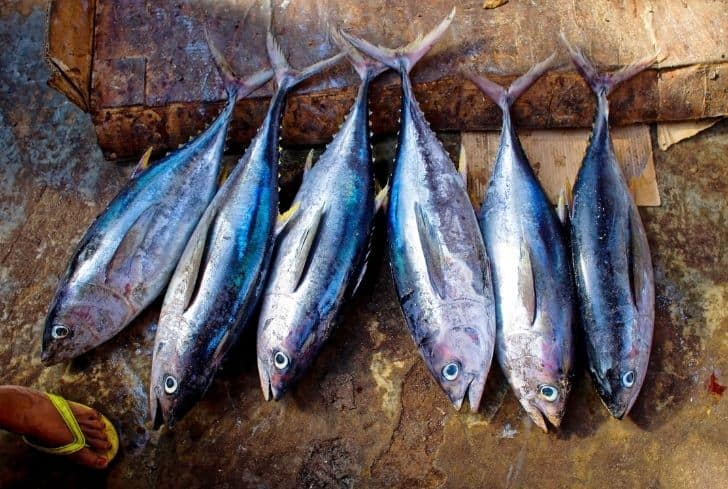The planet’s waters are full of beautiful creatures and sceneries, not forgetting they are the traditional routes of travel between most continents. The most common creatures living in these waters are fish, one of man’s important resources, as food. Fish are abundant in the majority of water bodies all over the world, meaning they have been consumed for centuries.
Apart from providing economic benefits to the people, fish are among some of the healthiest foods on the planet as they are loaded with nutrients like vitamin D, omega-3 fatty acids and proteins. However, what if you have too much fish in your house and it is going bad? What do you do with it? Should you throw it away or compost it? Well, this article will focus on composting fish.
Can You Put Fish in Compost?
Yes, you can compost fish, but some caveats apply. Composting allows organic materials to decompose in a controlled setting and is a natural and beneficial process. The majority of the items that can be composted are food scraps, with the general rule of thumb being that anything that can be consumed, can be composted.
The same applies to fish and bones. However, they cannot be readily composted as they pose some limitations if composted just like that. Fish and their bones, will become rancid and will therefore emit foul odors, thereby attracting rodents and other unwanted animals to your compost pile. Nonetheless, fish, fish meat and fish remains will decompose as they are organic matter.
The first thing to have when composting fish and other meats is a closed compost bin, like a compost tumbler. The reason behind this, obviously, is because as the fish becomes rancid, it will attract unwanted pests like rodents and raccoons. These guys can do all that is in their power to bring down the composting bin so that they have their way with the fish scraps.
Having a closed compost bin ensures they do not enter, even if they overpower it. Secondly, if you live in an area with dangerous pests like bears, avoid composting fish altogether. This is because they will do a lot of damage trying to get to the compost bin and of course the fish. The dangers of such pests invading far outweigh the benefits of composting the fish.
The third caveat is that when composting such waste as fish parts, the fish waste should be mixed with plant waste and buried at the centre of the pile. This, first ensures the pests do not get attracted to the pile and secondly, the centre of the pile will witness the most intense decomposition action. This means it will be hot enough to break down the fish quickly.
The fish waste ought to be mixed with plant waste such as wood chips, leaves, bark, branches, peat, or even sawdust. As the microorganisms break the fish down, they generate lots of heat, which pasteurizes the resulting fish compost, in turn eliminating any odor and killing disease organisms and weed seeds. After several months, the resultant product is rich humus lauded as a nutrient-wealthy fertilizer for soil amendment.
You should also consider cutting the fish meats and parts into smaller pieces. This ensures that the entirety of the fish decomposes in time, and also hastens the process.
Also, be sure to clean the fish and its parts before throwing it inside the composting bin, as this could bring in some dangerous bacteria, which will be harmful to the entire process. The ideal composting bin measures a minimum of 3 feet by 3 feet by three feet.
However, you can go for a bigger one; this has to be guided by the available space you have. A slight odor may accompany the decomposition process but generally occurs toward the bottom of the pile where it is less likely to offend your delicate nostrils.
Can You Compost Fish Skin?
Definitely, fish skins can also be composted inside a composting bin, like regular fish or other fish meats. The fish skins, like other fish scraps, offer nitrogen to the composting bin, which is a necessary part of the process.
As such, when composting the fish skin, mix it with some plant waste, like leaves, barks, and sawdust, which will offer carbon, the other necessary part of the composting process. Next, ensure the fish skin is in the centre of the pile so that it decomposes as quickly as possible, and will release the least amounts of odours. This keeps the pests away and will also not foul the air in your compound.
Also, ensure the bin is completely enclosed so that the pests, even if they come near it, do not manage to enter. Always use a fully enclosed composter and do not add the fish skins to an open above-ground compost pile, even one with enclosures made from poultry wire or wood slats.
Can You Put Fish Bones in Compost?
Of course, you can compost fish bones. Some people fear or avoid composting them because they can attract animals, which they will, but the composting process can still continue. Fishbones break down really quickly in hot compost systems compared to many animal and bird bones.
They are also an important source of calcium and other minerals. When decomposing bones, first, you need a very active, big and hot compost. Composting by burying the bones in the garden might have been the way in the old days, but is not the way to go here.
Remember, the bones will attract all sorts of pests and vermin, who will do everything possible to get to the bones, like exhuming them and digging up your garden, potentially damaging your crops. As such, use a big and enclosed composter.
Secondly, you need to break the bones so that the process is hastened. You will be able to freely add the chopped-up pieces at the center of the pile so that decomposition occurs as quickly as possible. You can also bake the bones in low heat for a few hours until they are crumbly.
Keep monitoring the baking process and once the bones hit the required state, pulverize them into powder form in a zip-lock type of bag and a mallet or something blunt. You will then incorporate the material normally into your compost heap, which will hasten the decomposition process and will not attract annoying pests.
Either way, follow the rules for composting, that is ensuring there is enough oxygen and water, the mix is properly mixed, and is regularly turned and you will get high-quality compost.
Can You Compost Cooked Fish?
Yes, you can compost cooked fish but you should not unless you are quite experienced. Most general composting guidelines recommend against composting cooked foods like fish, although there is no restriction on the same. As such, take extra precautions, like when composting raw fish.
There are several issues with composting cooked foods that can result in disaster, even if anything that rots can be composted. Cooked fish and other meats, fats and dairy, present challenges that most casual composters might not be able to handle.
First, there is the issue of these foods smelling bad.
The meats, fats, and dairy, in particular, can give off putrid odors as they break down, unlike plant scraps, which tend not to cause as much of a stink.
Secondly, as usual with any food, they will attract pests like biting flies, bees, rats, bears and other scavengers. They are attracted to the smell, which is another load of problems
Thirdly, they can easily turn to mush. Cooked foods easily putrefy, decay or rot, turning mushy and gross, which is not only unpleasant but interferes with proper aeration of the pile. This will definitely be a nuisance to your compound or neighbors.
Fourthly, they can go anaerobic destroying the entire process. Decomposing meats, including fish, can produce anaerobic bacteria, which is the archenemy of a normal, aerobic compost pile. These bacteria can interfere with the composting process and cause problems with odors and acidity.
Finally, they require high heat in the composting bin. To kill the harmful bacteria and help break down the proteins and fats, your compost pile will need to heat properly, a process that requires attention and maintenance. The bottom line is if you will compost cooked fish, take extra caution. However, if you are an experienced composter, go ahead and give it a try.
Can You Compost Fish Guts?
Oh yes! Fish guts combined with the sort of carbon material you have, are some of the best and fastest decomposing nitrogen sources. Like composting other fish craps like fish skins, the guts need to be cleaned and then tossed together with enough carbon materials like sawdust, wood chips and leaves.
They decompose quite easily and quickly, unlike the skins. All you need is to cover them well in the pile, so as not to attract pests as they decompose. The other reason is that they will decompose quickly in the middle of the composting pile and will therefore not produce lots of foul odors.
You can also go the direct route and rather than place them in the composting bin, you bury the fish guts in the garden, directly under the crops. The beauty behind this is that fish guts decompose in days quite quickly, and can offer nutrients to the crops.
Unfortunately, you have to keep the garden barricaded off from all pests and scavenging animals, which might uncover or dig them up.
How Long Does It Take For Fish to Decompose?
The duration for decomposing fish depends on the environmental conditions, as well as the conditions inside the composting bin. If the conditions are right, the process can take anywhere between seven and ten days. However, if the condition is not ideal, the process will take longer.
Some of the conditions that have to right include the carbon-nitrogen ratio, the pH, aeration, moisture and temperature inside the composting bin. First, the carbon-nitrogen ratio: it has to the simple recipe of three parts carbon to one part nitrogen. Therefore, throw your fish inside the composting bin with enough wood chips, sawdust, bark, leaves or tree branches.
Next, for the optimum composting of fish, have about 60% water to 20% oxygen ratios. Next, there needs to be a pH of between 6 and 8.5 and a temperature of between 54° and 65° C (130° and 150° F) during the decomposition process, and at least 54° C (130°F) for three consecutive days, to kill all the pathogens. You also have to consider what else is composted inside together with the fish.
The duration may also depend on the preparation made to the fish parts before being composted. If you pulverize the bones, for instance, the duration becomes considerably shorter, than if you failed to. Also, chopping the fish meat into smaller pieces ensures it decomposes much more quickly. If these conditions are met, the complete composting process can take a few weeks.






